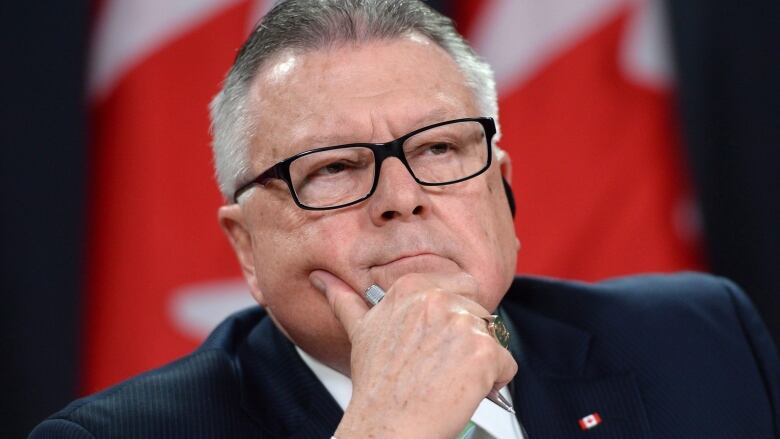National security oversight committee coming by summer, says Ralph Goodale
Liberals also creating 'centre of excellence for community outreach and counter-radicalization', says Goodale


The Liberals' promised national security oversight committee is in the works for a summer debut, said Public Safety Minister Ralph Goodale.
"We've come up with a Canadian model. We're drafting the legislation now, and we hope to have it in the public domain before the House adjourns in June," Goodale told host Chris Hall in an interview on CBC Radio's The House.
- Conservatives say security committee is a 'radical departure,' breaks election promises
- Listen to the full episode of The House
The all-party committee of parliamentarians will be tasked with reviewing security-related issues. Forming the committee was an election promise in response to the controversial anti-terrorism law known as C-51, and part of the mandate letter Prime Minister Justin Trudeau gave to Goodale.
"Canada is the only country in the western alliance that doesn't have that mechanism of review and scrutiny. We're the anomaly," Goodale said.
"We're going to fix that by adding a committee of parliamentarians to make sure that with new powers that are given to security agencies, there's also more scrutiny, more review, more protection of the public interest."
He added that the justice department is currently in the process of translating the model into legislative language.
Surprise — more consultations coming
During the election, the Liberals promised make amendments to bill C-51, but before any of that can happen the government will consult with Canadians first.
"We will have a series of very specific amendments to what we believe is wrong in C-51...but we want to hear from Canadians about what else they think needs to be added to that list," Goodale said.
Cross-country consultations will begin in the coming weeks and last "through the summer," he said.
"Canadians will get the say on C-51 that they did not have when the bill was first presented in 2015," Goodale said.

The anti-terror law was the focus of nationwide protests and opposition beginning when it was first introduced by the Conservatives in February of 2015.
Some expected amendments include changing the definition of 'terrorist propaganda,' and fixing elements around the no-fly list, Goodale added.
The Liberals have also promised to guarantee all CSIS warrants, respect the Charter of Rights and Freedoms, ensure Canadians aren't limited from lawful protests and advocacy and have a statutory review of the full Anti-Terrorism Act after three years.
Counter-radicalization centre this summer
The Liberals are also moving ahead on creating a "centre of excellence for community outreach and counter-radicalization" in time for a late spring or summer launch, said Goodale.
"We will be proceeding with the physical establishment of the office and the selection of personnel to run it," he said.
The Liberal government earmarked $35 million over five years in the 2016 federal budget to fight the radicalization of young people in Canada.
$3 million of that will be spent this year going towards hiring the coordinator of the centre and getting the it up and running.
The government will also be starting a "comprehensive examination" of cyber security systems.
Corruption: 'this is a critical global fight'
Speaking from London, England, where he was attending a global anti-corruption summit, Goodale said that Canada is committed to fighting the consequences of political corruption.
That includes looking at the idea of a mandatory public registry to trace ownership of public companies.
"Five or six countries have decided to do it, and another five or six are actively heading in that direction," Goodale said.
"Canada is considering it. We have jurisdictional issues that we have to cope with, because much of these responsibilities fall within provincial jurisdictions."
There are also privacy issues with such a registry, but "we will obviously examine this very actively", he said.
"This is a critical global fight, and Canada wants to be a part of it."